I have been getting a lot of questions about Penguin 4.0. This article will serve as a guide to everything we know on Penguin 4.0. I'll update it as more information becomes available.
When did Penguin 4.0 launch?
The announcement for Penguin 4.0 happened on Friday, September 23, 2016. However, it sounds like parts of this new Penguin algorithm were put into place prior to this date. We did see some sites have movements in keyword rankings on September 11 and also in the week in between. But, it's hard to know if those changes in early September were due to Penguin or due to other quality algorithms.
Updated October 6: Gary Illyes tweeted the following today which tells us that the part of Penguin that devalues unnatural links is indeed running:
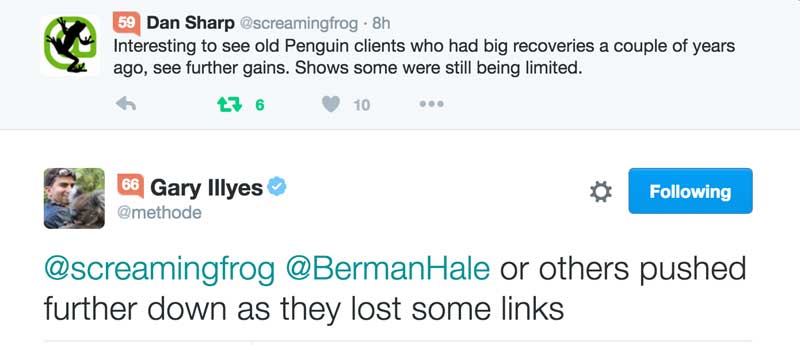
So far I haven't heard too many cases of sites saying they lost a lot of rankings due to Penguin.
What does it mean when Google says the new Penguin "devalues" instead of "demotes"?
Previously, Penguin had two components to it. It would devalue any unnatural links it found AND it would also put a demotion on the entire site. This demotion acted like a weight that pulled the site down and made it difficult to rank. You could not remove that demotion until:
a) You cleaned up your link profile
b) Google refreshed or updated the Penguin algorithm
It sounds like this has all changed now with Penguin 4.0. Gary Illyes from Google has said that the new Penguin does not demote any more but simply devalues unnatural links:

This has HUGE implications. It seems to me like this opens the door for spammers or people who are trying to test the limits of Google to create all sorts of self-made links without fear of doing damage to their site. I am suspicious that Google may soon increase the number of manual actions that they release in an effort to scare people away from trying to trick the system.
Update: If you test Penguin you could lose ALL of your PageRank
On October 13, 2016 at a keynote speech in Pubcon, Gary Illyes said the following:
If Penguin sees signs of manipulation, it can decide to discount ALL the links, which can be pretty bad for a site.
He went on to explain that if Real Time Penguin determines that you have been trying to manipulate the system, it's not just the unnatural links that get devalued, but potentially ALL of your links. That is huge news.
Some are saying that Google is just bluffing with this threat. If this fact is true, then it means that negative SEO is still possible. Gary Illyes from Google says that they have never seen a single case of negative SEO that actually worked. Many others would disagree.
I think that the black hats will have a field day testing this. But I think that for the average small business owner, the fact that Penguin could cause all of your links to get devalued should cause enough fear to dissuade them from experimenting with paid and self made links.
Do we need a disavow file any more?
If Penguin is simply devaluing links, does this mean that there is no need to disavow links in order to escape Penguin or prevent a Penguin hit? It is possible that this is now the case.
However, Google has given us confusing information on this point. They have said several times in the last couple of days that nothing changes in regards to their recommendations for using the disavow tool:
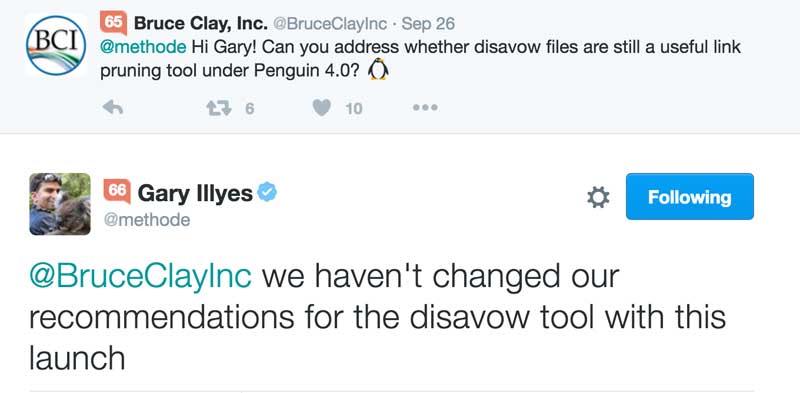
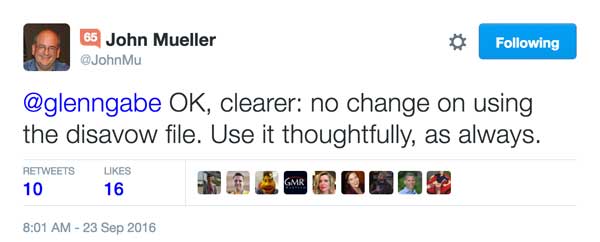
So, what were the previous recommendations from Google on using the tool? Did they say previously that it should be used for Penguin? Well, yes:
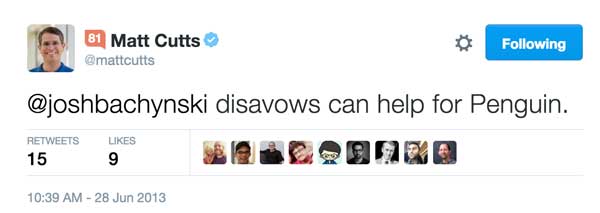
Also, in a Webmaster help video John Mueller was asked whether disavowing links would be sufficient for removing a Penguin demotion or whether we needed to be physically removing unnatural links. John said, “With regards to algorithmic changes that were picking up on problematic links, technically you don’t need to do that [remove links]. You CAN just use the disavow tool.” He went on to say that practically it does make sense to do a cleanup where possible, but, “for our algorithms, the disavow file is essentially sufficient in those cases.”
I haven't made up my mind on how to advise people in this matter just yet. Google has said that there are other reasons to disavow. If you have spammy links those links could lead to a manual action. Or, they could be used in other algorithms that use links. We don't know what those other algorithms are though.
My advice at this time is to go ahead and do a link audit if you have a large number of truly unnatural links that you have not already disavowed. If you're on the fence though, I'd wait for more information before spending the time and money on a full link audit. This makes me sad because my favorite work days were the "Netflix and link audit" days.
Should we be removing links from our disavow file?
I never thought that I would say this, but I think that some websites may benefit from reviewing their disavow file and removing borderline links. That may be hard to do though if you have disavowed on the domain level and can't assess the link which you were disavowing. If you have obviously spammy or paid links in the file, I think they should stay there. But, if you were indecisive about some links and not sure whether to include them in your disavow, it might make sense to remove them.
I think that it is possible that quite a few people have disavowed links that could actually be helping them. In the past, if I was doing a link audit for a site that had a severe Penguin problem or a manual action for unnatural links I would err on the side of caution and disavow anything that could remotely be seen as unnatural. My reasoning for this was that I would rather disavow a few good links than risk being stuck with a Penguin demotion that could last for years. In the past, the only sites that I saw have nice recoveries were those that were brutally thorough in their disavowing. But now that Penguin no longer demotes, it doesn't make sense to be so aggressive in disavowing.
I wouldn't make any big changes just yet. As we get more information and have done more testing I will update this section with my current advice.
Added October 6: John Mueller was asked in a Webmaster Help Hangout if it was a good idea to remove links from our disavow files and he said,
That sounds like a particularly bad strategy. If this is something that you really don’t want to have associated with your website then you should keep that in your disavow file. That’s nothing where I’d say that for this one specific algorithm Google was able to devalue those and handle them on our own therefore I won’t tell Google anything about the problematic links that I found. I think that’s a bad idea. I’d keep the disavow file. I’d use the disavow file for any links that you really don’t want to be associated with and then you’re sure that they’re not taken into account across the board.
Are sites that were previously hit by Penguin making recoveries?
This tweet series was mind blowing to me:
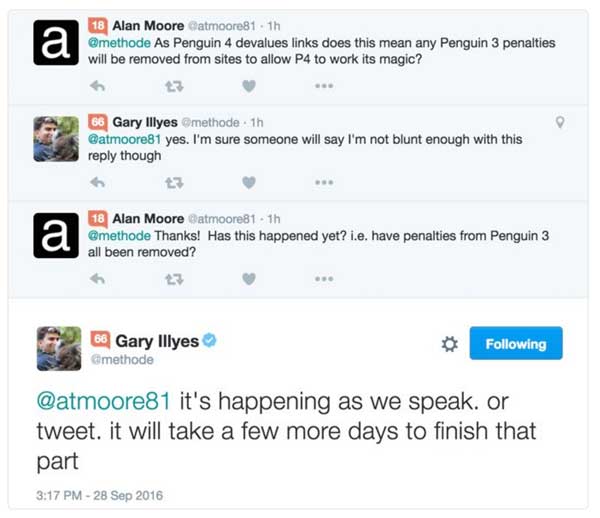
Wow. Gary is saying here that any site that was previously suppressed by Penguin will have that suppression lifted. This is happening right now and will take a few more days to be completed. That is amazing! I am seeing evidence of this for some sites, but not for all. I am still seeing sites with Penguin suppressions that have improved keyword positions from page six to page 3 and then page 2 and even the bottom of page 1. I have one client who was told by a Google employee that they have a mild Penguin problem and today they have moved from #3-4 up to #1 for several important keywords.
But, I have several sites where I really felt there was a Penguin suppression and these sites are seeing no improvement. This could mean that they either were never suppressed and simply had lost rankings as a result of losing the power of links they previously made, or it could mean that they have been too aggressive with their disavow and disavowed too many good links.
I will be watching a large number of Penguin hit sites over the next few days and weeks to see what is happening here.
Update October 12: Today, Gary Illyes stated that all Penguin suppressions have been lifted.
Does this mean that negative SEO is not possible?
There will always be ways to do damage to a competitor. However, there is a good chance that the tactic of reducing a competitor's rankings by pointing spammy links at them will not work any more. In reality, I saw very few cases where I felt that negative SEO via spammy link building was actually working. However, here is something quite interesting. The following chart shows Google organic traffic to a site that I really felt was hit by a negative SEO attack in October of 2014. The site had not built any links of their own and when I reviewed the site I encouraged them to share their story with John Mueller from Google as I really did feel that they had been unfairly hit by Penguin. (Note: I do not recall seeing any other cases like this where I felt link spam negative SEO was effective.)
It looks like this site is making a full recovery, but it is quite early yet:

What does it mean that Penguin is now "real time"?
In the past, if you were hit by Penguin, the suppression would happen on a day when Penguin refreshed/updated and you could only recover when the algorithm was refreshed/updated again. This is no longer the case.
"Real time" does not mean that you will see Penguin changes instantly. But, as Google recrawls the web, changes can be seen.

What does it mean that Penguin is now more "granular"?
We don't fully have the answer on this one. Previously if a site was affected by Penguin, it would cause a demotion that affected the whole site. Now that Penguin is no longer demoting, this is not the case. Google's initial announcement on Penguin says, "Penguin now devalues spam by adjusting ranking based on spam signals, rather than affecting ranking of the whole site." The way that I interpret this is that Google is saying that Penguin will decide what to devalue on a link by link basis.
However, others have interpreted the granularity to mean that Penguin will affect different pages on your site in different ways or perhaps different keywords in different ways.
What are we seeing in terms of recovery?
I have reported on several Penguin 4.0 recoveries that I have seen. Most that have recovered saw jumps in keywords from beyond page 6 up to perhaps page 2 or the bottom of page 1. This type of recovery won't result in a big change in traffic however. There have been quite a few other similar recoveries reported on Twitter as well.
The changes that I am seeing for previously Penguin hit sites are in keyword rankings. But, please note that an increase in rankings from page six to page two or three will not result in a change in traffic. As such, you may not see much on Google Analytics.
A great way to check your keyword rankings is on SEMRush.com. If you don't have a paid membership, you'll only be able to see a few keywords. Type in your domain name here*:
Then click on organic research in the top left corner:
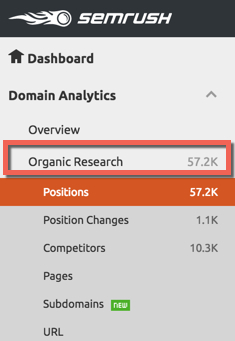
You'll be able to see a good number of keywords and whether they have improved in rankings. If you are a paid member, then, look over to the right hand side. I can't believe that I never saw this until just recently, but SEMRush allows you to see historical data so that you can see where your keywords are ranking previously:
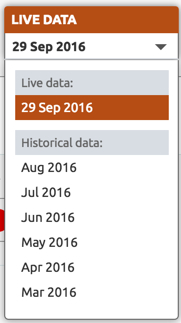
Another way to look at keyword rankings is to use Google Search Console Search Analytics which is free. The "Queries" section will show you quite a few keywords you are ranking for and you can compare dates to see how you used to rank for these last week, last month or up to three months ago.
If you have not seen recovery yet, do not panic. We are still only a few days into the age of Penguin 4.0.
I will keep this post updated as new information comes along.
*Note: If you sign up for SEMRush after clicking on my link I'll be paid an affiliate commission. Please know that my recommendation of SEMRush has nothing to do with the possibility of getting paid. It really is a great tool.



Comments
Mistake in Penguine 4.0 date – its 2016 not 2015
Ah thanks! I’ve corrected it now.
WOW! That historical data in SEMRUSH is gold, thanks Marie! 🙂
I know! I couldn’t believe I hadn’t heard about that before. Glad you found it useful.
Hello Marie, good post.
I’ve seen changes in serps from sep 2nd and of course later. Now I’ve seen jumps in certain keywords from #30 to #4 and so on, so I guess in some countries penguin 4.0 is still making adjustments.
Very informative your article specially when you talk about disavow. Thank you for explain it.
Hi, Marie. Thanks for posting, just finding this article now. For better or worse what I liked about Penguin 4.0 was mentioned in that: “Penguin does not demote any more but simply devalues unnatural links”.
Having done through a manual action / disavow once with Google I can say this was a major pain. The thought of Google acknowledging bad links when they see them and therefore not being required to jump through the hoops of contacting spammy site owners will save people a lot of time.
I agree the links shouldn’t be there in the first place, but if Google recognizes these sites as garbage just disregard the links.
Thank you for posting this, very helpful. Is it possible that some sites could just now be receiving penalties from Penguin 4.0, even though it was released in September?
I’m not sure if you’ve read the article, but according to Google, Penguin no longer suppresses sites, so no, you should not be penalized by Penguin.